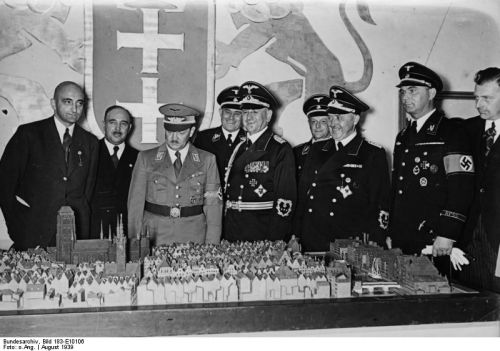Erich Koch

Erich Koch, third from left and Artur Greiser, second from right study a model of Danzig (Bundesarchiv)
Erich Koch was born on June 19, 1896, in Elberfeld. Following undistinguished military service during the First World War, Erich Koch became a railway clerk until he was dismissed in 1926, for anti-republican political activity. Having joined the Nazi Party in 1922, he was involved in the revolt against the occupation in the Ruhr and was imprisoned several times by the French authorities.
Between 1922, and 1926, he was one of the Party district leaders in the Ruhr and a supporter of the radical wing of the Nazi Party led by Gregor Strasser. From 1928, Erich Koch was Gauleiter of the Party in East Prussia and leader of its faction in the provincial area. From 1930, Koch was a member of the Prussian State Council in July 1933. Koch was appointed to the post of Oberprasident of East Prussia in September of the same year.
His autocratic rule never permitted the SA or SS to come to the fore, as in other districts, but Koch's advocacy of collectivization in agriculture made him unpopular with the peasants and he was ruthless in arresting his critics, or expelling them from the Nazi Party. During the Second World War Koch proved himself one of Hitler's most brutal satraps in the occupied eastern territories. Koch's criminal orders caused the deaths of untold numbers of nnocent men, women and children. They were deported to concentration and forced labour camps and the razing of countless villages to the ground.
In addition to East Prussia, Koch was appointed as head of the civilian administration in Bialystok, and from October 1941, to 1944, he served as Reichskommissar in the Ukraine, with control of the Gestapo and the Police. His first official act in the Ukraine was to close local schools, declaring that, 'Ukraine children need no schools. What they'll have to learn later will be taught them by their German masters.'
In a speech in Kiev made on March 5, 1943, Koch was explicit about the methods he intended to use to build a slave State in the Ukraine, and his complete contempt for Slav 'untermensch- sub-humans.. We are a master-race,' Koch insisted, which must remember that the lowliest German worker is racially and biologically a thousand times more valuable than the population here.' Thanks to his twisted policy of brutal Germanisation and the repression, murder and exploitation of Poles, Ukrainians and Jews, Koch's empire was soon infested with partisans.
After the loss of the Ukraine, Koch returned to Konigsberg, and then after the fall of East Prussia, he disappeared to the western part of Germany, until his arrest by British security officers in Hamburg at the end of May 1949. His extradition was demanded by the Polish and Soviet governments who regarded Koch as one of the worst war criminals, directly involved in the extermination of the Polish intelligentsia, Soviet partisans and hundreds of thousands Jews in Bialystok and the Ukraine.
On January 14, 1950, Koch was handed over by the British forces to a prison in Warsaw, but his trial did not begin until October 19, 1958, when Koch was charged with the responsibility for the death of 400,000 Poles - his crimes in the Ukraine were not included. Erich Koch was sentenced to death on March 9, 1959, by the Polish district court in Warsaw, for having planned, prepared and organised the mass murder of civilians, but his sentence was commuted to life imprisonment on account of his ill-health.
In a state of partial collapse through most of his trial, rousing himself only to protest that he was a 'Christian, a good socialist, and a friend of the workers,' Koch was fortunate to benefit from an article in the Polish penal code, which prevented the execution of bedridden persons. Erich Koch died in a Polish prison at Barczewo, on November 12, 1986. ,
Sources
Who’s Who in Nazi Germany by Robert S Wistrich, published by Routledge, London 1995
Photograph – Bundesarchiv
© Holocaust Historical Society, October 26, 2021

